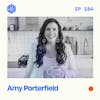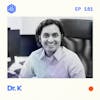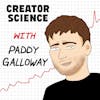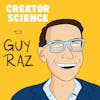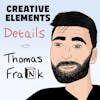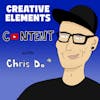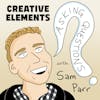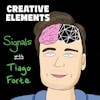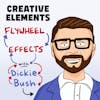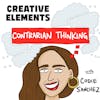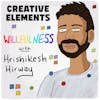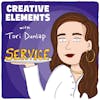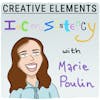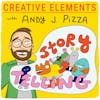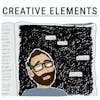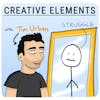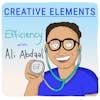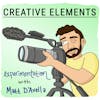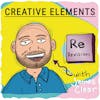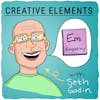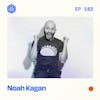
#182: Noah Kagan — Behind the scenes of writing (and marketing) Million Dollar Weekend
Play EpisodeNoah Kagan is the CEO of AppSumo, an eight-figure company that is the number-one software deals site.
Noah Kagan is the CEO of AppSumo, an 8 figure company that is the #1 software deals site. He also runs a YouTube channel where he shares his tips for finding financial freedom with more than 930,000 subscribers.
Before AppSumo, he was the 30th employee at Facebook reporting directly to Mark Zuckerberg and the 4th employee at mint.com.
Noah has built this reputation for being a relentless tinkerer. He's constantly running small experiments. A couple weeks ago, Noah's new book, Million Dollar Weekend, officially became available for sale. And since that time, he's been everywhere. The Tim Ferriss Show, School of Greatness, Deep Dive with Ali Abdaal. In this episode, you'll learn about his experience making the book itself.
Full transcript and show notes
Listen to my episode with David Moldawer
Listen to our publishing playlist
Noah's Website / YouTube / Twitter / Instagram / LinkedIn
***
CONNECT
📫 Get my Professional Creator Crash Course (free)
🧰 Get my full gear list (free)
🙏 Make a guest or mailbag request
📝 Check out our curated Playlists
***
SPONSORS
💼 View all sponsors and offers
***
SAY THANKS
💜 Leave a review on Apple Podcasts
Learn more about your ad choices. Visit megaphone.fm/adchoices
Noah Kagan [00:00:00]:
Put together $1,000,000 a week, and I was like, I'm gonna test 50 different covers. Once I found the winning cover via Facebook ads, then I tested the color variation of the cover. Then I tested mocking it up in bookstores and mocking it up in Amazon. And that's how we ended up on green because it's also my favorite color, but this is the ultimate version that you don't see business books in green.
Jay Clouse [00:00:31]:
Hello, my friend. Welcome back to another episode of Creator Science. For the past 2 weeks, you've probably seen a lot of today's guest, Noah Kagan. Noah is the CEO of AppSumo, an 8 figure company that is the number 1 software deals site. He also runs a YouTube channel where he shares his tips for finding financial freedom with more than 930,000 subscribers. Before AppSumo, he was the 30th employee at Facebook reporting directly to Mark Zuckerberg and the 4th employee at mint.com. So here's the thing. AppSumo is obviously a large company.
Jay Clouse [00:01:05]:
They're aiming for more than $56,000,000 in revenue this year alone. And at the same time, Noah has built this reputation for being a relentless tinkerer. He's constantly running small experiments. The results of those small experiments can be really big over time. So a couple weeks ago, Noah's new book, $1,000,000 Weekend, officially became available for sale. And since that time, he's been everywhere. The Tim Ferriss Show, School of Greatness, Deep Dive with Ali Abdaal. If you're running in the same circles that I am, you probably can't miss him.
Jay Clouse [00:01:38]:
A lot of those interviews are great, by the way. I really recommend his episode of Tropical MBA with Dan Andrews and that 4 hour conversation on the Tim Ferriss podcast. But to make this episode different, I decided to not talk about the content of the book, but his experience making the book itself. As a consummate entrepreneur and hilariously honest guy, I thought he might have a unique experience writing this thing, and he did not disappoint in this interview.
Noah Kagan [00:02:04]:
So I wrote a book proposal called The Challenge, and it was all these challenges that you can do to get confidence, overcome fear, overcome rejection, and be able to have success in life. And I sent it to an agent who's James Clear's agent. Her name is Lisa Dimona. And she said, yeah. This is trash.
Jay Clouse [00:02:22]:
That story has a happy ending because Lisa did end up representing Noah in this book. But what you see here is Noah's typical quick and dirty experimental approach may not quite work in a traditional publishing setting. But Noah took that initial rejection and spent a year putting together a new proposal.
Noah Kagan [00:02:39]:
Then you take this proposal and you you pitch it like you do a presentation to different publishing houses. That I took so not seriously. I'm just, like, goofing off. I'm like, yeah. This book is I think it's gonna sell pretty damn great. I'm gonna it's gonna sell well. And I just kinda goofed off, and I I remember trying to sell it for about $100,000 advance. And for me, personally, I'm not trying to get rich no.
Noah Kagan [00:02:58]:
I'm not trying. I will not get rich on the book at all. And I just didn't take that as seriously, and it turned into a bidding war.
Jay Clouse [00:03:04]:
Later in the interview, Noah tells us exactly how much of an advance he got, and I almost fell out of my chair. But then after the proposal process, he goes to work writing the book, and he decided to call in some help. He got in touch with the cowriter on some bestsellers, including Never Split the Difference and Never Eat Alone.
Noah Kagan [00:03:20]:
So I wanted to hire the best business writer in the world, so I cold messaged Tal, and then he's a shit ton of money.
Jay Clouse [00:03:26]:
I think you get the point. This is a very fun, very honest look getting into the weeds of Noah's publishing experience from idea to now marketing the book post launch, even sharing the cost that he explored of services like ghost writing and more. I'd love to hear what you think about this episode. You can find me on Twitter or Instagram at jklaus. Tag me. Sharing the show is what helps us grow. It truly, truly does. So thank you for helping to spread the word.
Jay Clouse [00:03:49]:
But now, let's talk with Noah. So you've got a 9 figure business doing 8 figures in revenue. Why have you chosen to create content as a personal brand outside of just continuing to crush the software world?
Noah Kagan [00:04:10]:
It's fun. It's really, really fun, and I get to meet cool people. Right? Either cool people that I get to go on their yachts or go on their private jets or people I interview like, I just interviewed last year the founder of Kinko's, and it was so cool. Yesterday, I went to Kinko's. You know? Like, what a what a cool thing that it's provided.
Jay Clouse [00:04:27]:
Yeah.
Noah Kagan [00:04:27]:
And I I think as well from a business perspective with AppSumo, it's brand awareness. At the end of the day, if you think about a lot of the best brands out there, there's a person next to the brand or in front of the brand, and I I think that applies for all businesses today. So and that doesn't mean it has to be you. It could be like, right now at AppSumo, there's a guy Mitchell who works for us that's building his own brand as a part of AppSumo. And so I would say a lot of the AppSumo customers hear about me in some of these videos, and they're like, what's this AppSumo thing?
Jay Clouse [00:04:53]:
I'm a
Noah Kagan [00:04:53]:
go check it out.
Jay Clouse [00:04:54]:
What's the relationship of those 2 entities? Because I know some folks who are doing their own thing on the side of their business, and they, like, very much church and state it. They're like, these are separate things because I'm building a bridge to the future, and I'm bored of my business. But it seems like you're explicitly using it as I wanna drive attention to the main business as well.
Noah Kagan [00:05:13]:
Is this like an interview from the IRS? Good.
Jay Clouse [00:05:15]:
Like, a lot of your We don't have to go into, like, the bank accounts. I'm saying, like, how you think about it in your mind.
Noah Kagan [00:05:21]:
Yeah. So I started my content before I started my business. And so for everyone out there, if you don't have a business yet, build up an audience even 1 at a time. Right? It doesn't have to be a large audience to have large success. And I've always been content, you know, since 2000 on my nokegan.com and blogging and and, you know, social media with Twitter stuff and Facebook and YouTube lately. The way I approach it, though, which I think has been beneficial, is that I have AppSumo be my main sponsor. So I have a separate LLC called Taco, and AppSumo is my number one sponsor of it, and then I have a separate entity, which for tax reasons is much more beneficial. So there's no salary tax, there's no payroll tax, and then there's a lot more deductions in that separate entity.
Noah Kagan [00:06:01]:
I also think in in in main businesses, if you have a content arm, you can experiment and fail on lighter things, on on quicker things. And then if it works, you know, kinda teach that back into the AppSumo ecosystem. But, yeah, they're 2 separate entities.
Jay Clouse [00:06:14]:
How do you think about distributing your time across these 2 universes of AppSumo and all things Noah Kagan?
Noah Kagan [00:06:23]:
Well, I'll tell you candidly. I think I used to feel very self conscious about Noah Kagan. Right? Like, who is he, and should he be public, and how public can he be, and should he share things? And I I do like it, but I think I felt more you know, I want this external validation.
Jay Clouse [00:06:36]:
Like, if
Noah Kagan [00:06:36]:
I can get on Jay's show, then, you know, he likes me and this audience likes me, then I'll be liked. And over time, as you get older and as you understand yourself better and you and you do things that you feel good about yourself, you're just like, oh, this is me, and I'm okay with it. And if others are, great. If they're not, that's okay too. And lately, I would say with I have the book launch. I have a pregnant girlfriend, the YouTube channel, and AppSumo. I'm not doing it well. And I would say being an entrepreneur, though, moving past book launch, my main aim is to just control my time better.
Noah Kagan [00:07:06]:
So I would say, traditionally, it's been maybe 4 days a week AppSumo and then, like, half of a day. So maybe, like, 5% of the week doing the Noah Kagan brand. So that would be YouTube videos or creating tweets. Now with the book launch, it's probably, I don't know, four and a half days of book marketing and then half the time on AppSumo check ins. But that's also really interesting for people to think about that are starting or as they're growing a business. You don't have to do the work. And I know when someone told me that, I I was like, well, you're a loser because I like working. But it's this it's actually this reality where find the people that enjoy that work, and they're better at it than you and and really do your best, which is hard to stay the hell out of their business and out
Jay Clouse [00:07:43]:
of their
Noah Kagan [00:07:44]:
way and pay them whatever they want. And so that is nice where there's Sean and Alona and Anna and Kellan and Chad running AppSumo so I can hang out with Jay. Yeah. And I think this is is a good higher level concept for everyone. It's like, what do you like doing? Like, I don't like customer support. I don't like doing sales anymore. I don't like programming. I don't like I like talking about cool stuff.
Noah Kagan [00:08:04]:
The team's like, yeah. You go do that. I was like, really? I can just do this? Like, yeah. Get the hell out of here. You bug us.
Jay Clouse [00:08:08]:
Mhmm. I feel I feel like this is uniquely challenging for folks in this audience's position because in, like, software or traditional business, a lot of times, it's like, you start by you are doing the work, and then you hire people who can do that work instead of you. And in this business model, a lot of the work that you're doing is creating content under your your name and likeness. And so to hire someone else to do that, you can do that if you feel comfortable with that. With some people, they just feel, like, morally, that that's not something that they will do. But even if they do feel morally good about it, it's really hard to hire people that can do this as well or better than you, and they're not doing it on their own.
Noah Kagan [00:08:46]:
I've tried so long. So I've done this this YouTube channel really started, say, 3 years ago in my house with my phone. And for maybe the last 2 years, I've really tried to avoid doing the work. So I'm like, guys. Alright. Here's how we get other people to knock on doors, and then here's how we're gonna get another person. And most of the times, there's things you can actually outsource, and I can talk about that. A lot of the times, though, it's like, I ultimately will end up doing it, and I like it.
Noah Kagan [00:09:09]:
Or there's things like, I heard from Joe Rogan's someone who's familiar. Joe Rogan is his own scheduler. Yeah. You know about this?
Jay Clouse [00:09:16]:
Yeah. Well, I think Chris Williamson said it on this show too. Chris Williamson said it on this show too. Chris Williamson said it.
Noah Kagan [00:09:19]:
So he's like, schedule it. I heard that, and I was like, oh, that's so interesting. And there's things that we're each uniquely skilled to do. And I would say for mine, it's like I can get access potentially to some of these billionaires, which is what it's funny. I've been on a lot of shows, and no one asks at all about knocking on doors with the content I create. They're only asking about the billionaire stuff, which is kinda interesting to notice what people observe. But the team is the one that does all the prep work. The team is the one that's like, before we even get going, your titles, the thumbnails, here's all the questions.
Noah Kagan [00:09:46]:
Ask in this order. Don't go out of order. Make sure you do it in this specific area. So the team really preps that. So I'm kinda just doing the parts I really enjoy. On the social media side for content, I've had different agencies. So I've used 2 agencies. And what's interesting, what everyone can do is send one of your tweets to someone you trust or you like.
Noah Kagan [00:10:05]:
And Sam Parr is a good buddy of mine. He would always text me. He's like, this is such dog shit. I know it's not you. He would always do that. He would be like, I know you're faking it, bro. Don't be a bitch. And I was like, okay.
Noah Kagan [00:10:17]:
Okay. It's 9 AM. Calm down. Buddy was right. And then I would read it, and I was like, this just doesn't sound like me. So, yes, you can create brand voice. Yes. You can create, you know, your brand essence.
Noah Kagan [00:10:27]:
And maybe AI and some of that can kinda create a variation of it, but, ultimately, we're we're our own tastemakers. So finally, I found bringing it in house. So there's a 17 year old kid named Jay
Jay Clouse [00:10:36]:
Great name.
Noah Kagan [00:10:36]:
And Sylvie that do a lot of the rough drafts of the content, and then I'm the final editor, which is just like a restaurant. Like, the chef doesn't come up with dishes. All the other chefs do, and then they finalize it and approve it.
Jay Clouse [00:10:46]:
Yeah. So I've tried some of this too. If we use that same analogy, it's still hard because if you hire a sous chef who's like, here's the meal I made, and you taste it, you're like, this is terrible. I can't even fix it. I have to start it over from scratch. Like, it's so hard to find people that are even good enough that they can match the brand voice so that it's just tweaking rather than, like, I gotta strip this down to the absolute studs because then that becomes just like doing this duplicative work. You're basically doing the same thing over again. And a lot of, like, this brand voice stuff, it's a moment in time.
Jay Clouse [00:11:20]:
Like, I haven't experienced I'm very pessimistic on this right now, but I haven't experienced somebody who can can, like, change with you over time so that it doesn't feel stale 3 months from now because they're still acting as you who you were 3 months ago. Yeah.
Noah Kagan [00:11:35]:
When you see Brent voice, which is really funny, what you're saying is, like, can someone else be Jay Klaus?
Jay Clouse [00:11:38]:
Right. Which no one can.
Noah Kagan [00:11:40]:
I mean, it's just and which is also your advantage. Right? So when you create content, think about what's in your no one else really only a, you know, a 100 people work at AppSumo. Right? So that's an advantage, and everyone has advantages. You know? Maybe it's geographical. Maybe it's professional. Maybe it's your skills or experiences. The thing you can think about that I think about with content is that we were doing emails for our book launch, and I wanted the emails written. And what's the point of each email? And so one of the emails was written, and it was, hey.
Noah Kagan [00:12:06]:
Noah did marketing on the book. Here's 3 things about the marketing. Go buy the book. And I saw that, and I was like, oh, I I can't send that. And I wanna send an email where even if you don't buy the book, you're like, this email is fire. Yeah. This is just a fire. And if this email's so good, then the book must be good.
Noah Kagan [00:12:20]:
And so that did take me and the team sitting together and saying, y'all, like, this is good. Let me share some stories because I think stories is what sells, and let's try to reframe it better. And so I did a Zoom meeting. I think it was, like, a 30 minute meeting with the 2 writers, Jay and Sylvie with Tommy's assistance. And then by giving them a little bit more of the pushback on stories and framework, then they came back with the final product again. And I was like, okay. Yeah. This is excellent.
Noah Kagan [00:12:44]:
I think the other way that it's worked well with Jay and Sylvie because they don't have my stories, not all of them, But they can do graphics. Right? Like, they can do graphics of things I've talked about. Mhmm. Or they can repurpose things I talk so I've talked about law of 100, or I talk about how, you know, getting your 1st dollar is important. So then they can say, alright. What are their stories out there or things that we can do to complement that? As well as they can pull a lot of things from podcast and YouTubes and even just working with me that that creates the actual content itself.
Jay Clouse [00:13:13]:
After a quick break, Noah and I dive deep into his book writing experience. So stick around. We'll be right back. And now back to my conversation with Noah Kagan. Okay. Well, I wanna I wanna transition into the book process, and I guess the starting point for that I know you've been working on this for 4 years. So what was going on 4 years ago that you said, you know what? I'm gonna write a book.
Noah Kagan [00:13:36]:
Everyone's got a book in them. Right? Everyone's got a story. And guess what? We're the authors of our own story, which is so cool. When you realize you have that power. When COVID hit and I was making my 1st YouTube video on my phone, I was like, I'm gonna do a book because I, you know, I think it I was around 36 or so. I thought I've done it enough times. I've helped enough people. I've put out this article on Tim Ferris' blog that's been validated enough where I'm like, this stuff works.
Noah Kagan [00:13:59]:
So I wrote a book proposal called The Challenge, and it was all these challenges that you can do to get confidence, overcome fear, overcome rejection, and be able to have success in life. And I sent it to an agent who's James Clear's agent. Her name is Lisa Dimona. And she said, yeah. This is trash.
Jay Clouse [00:14:17]:
And I
Noah Kagan [00:14:18]:
was like, what do you mean? I got, like don't I have social media and, like, a YouTube? And the YouTube was small at the time, and she's like, yeah. But this is like you're not serious. And then the yeah. The reality was I wasn't in that point. And that's a great moment. You know? In all in all of our lives, it's like when you get rejected, which we all will face some failure or rejection, it's a test of whether you want it or not. And I I thought about it. I've always wanted to have a book, and I always wish I had this book when I was younger.
Noah Kagan [00:14:41]:
And so that was a moment for me to decide the character, me, how I wanna proceed in the story. And I was like, alright. Well, what do I need to do to now face this rejection and overcome it? Because I I do want a book, and
Jay Clouse [00:14:51]:
I
Noah Kagan [00:14:52]:
I've got 1 book in me. This is 1. This is the first one in the sequel are right here. Then I spent a year working on a proposal. And this is available for all of us. I think that's what this book really is teaching people. It's not being rich is cool. Yes.
Noah Kagan [00:15:05]:
And all that stuff. But it's really that we can do things we didn't think we could do. And we can live lives we didn't think we could. That's what the book is about. For me with the proposal was like I I went then hired you know we're not all the best in something we're the best in something but not everything and so I found this guy David who wrote James Clear's proposal
Jay Clouse [00:15:21]:
Hey. I wanted to pop in here real quick to say that right now, Noah is talking about David Maldour. This is a man who has spent more than a decade in book publishing, acquiring and editing best selling books for Penguin, Saint Martin's Press, McGraw Hill, and Amazon Publishing New York. He's been on the show. We went in-depth into the world of publishing and what makes a great proposal. So if you wanna hear that, listen to episode number 163 of this podcast next, which I've linked in the show notes.
Noah Kagan [00:15:47]:
And I paid him some money, and I said, David, let's work on this together because he is literally he used to buy proposals for Penguin. Now he's kinda famous for writing proposals. So I worked on it with him for a year. And so that that was really, like, the impetus where I was like, I've always wanted this book. I've dreamed of it. And I felt after so many years of doing it myself, finally doing it, helping others do it, I'm like, yeah. I feel confident that I can teach people how to do this, and the proposal then was really the start of that journey.
Jay Clouse [00:16:13]:
So here's something I'm thinking about. First of all, I'm about to interrogate you on why you went traditional versus self publishing with the reach that you have, so prepare for that. Second of all, as I think about the world of self publishing, I'm wondering if the book proposal process is still worth doing as a way of clarifying the concept itself. Like, if you did not do that proposal, do you think the book itself would have been radically different?
Noah Kagan [00:16:40]:
Yes. I mean, the 1st book was called The Challenge. Right? And and there's a difference between a tweet and a book. And there's a difference between a a book and a great book, and I I like to think this is a great book. But the proposal really makes you think and publishers don't care about your book in in some sense. They just care about the. Like, nowadays, the people that are getting books bought for 1,000,000 of dollars, it's really about their reach. It's not necessarily if they can tell a good story.
Noah Kagan [00:17:03]:
There are books that that can you don't have to have reach, but they're just so good that people talk about them. And that's ultimately what sells books. One, get validation on your ideas before you even think about proposal. Right? Put out tweets. Did this tweet go viral? Like, every time I've talked about how to create a business very quickly, people like it. I'm like, alright. That's kind of interesting. And then the proposal was really solidifying, like, how can this be a concept and as well as how does this get marketed and differentiated in a market of, there's a lot of business books out there.
Noah Kagan [00:17:28]:
I have them in my shelf. You know? And there's so much content out there. And so what makes this one different? And really thinking about it deeply, which is the difference I'd say between a self published and a traditional where to be a traditional public, it takes a long time. And I guess I've always equate it to be in the what's the major leagues versus the minor leagues.
Jay Clouse [00:17:46]:
And that's why you went traditional publishing ultimately?
Noah Kagan [00:17:49]:
Probably honestly for ego, if I'm if in all in all seriousness. You know? And if you think about it in a lot of regards, in today's day, which we're in 2024, name 2 books that are self published that are, like, mega bestsellers. Name 2. So number 1 is the bible. That was self published. Well, it's like a 2nd or third one. Like, maybe her mosey a little bit, maybe pathless path. But even those, like probably not.
Noah Kagan [00:18:17]:
Right? Okay. Now let's name published books everything else. And for me, I I wanted to I've done 2 self published books, which not a lot of people read. And and I think, ultimately, it's there's some function of, like, you're taking it serious. Not to say you can't with the self published, and I think that's a great approach, and I think that can be more popular over time. But in in where we're at today and is that there's not as many traditionally published books. And if it is, like, you're serious about having to succeed because it it's 3 years for 1 book that's not gonna change. Like, if we've already printed 30,000 copies of it, it's it's pretty much set in stone.
Noah Kagan [00:18:50]:
And, also, it's fact checked like hell, and it's copy edited like hell, and it's got all these people that have looked into it, which is different than a self published book, and and both are good. I I just wanted to swing for the fences. I think I've done enough singles that I was like, if I'm gonna go for it, let's go all the way.
Jay Clouse [00:19:04]:
I wanna zoom in even more to the the timeline and the aspects of this because you strike me as someone who's very honest. So I just like to hear, you know, through that 4 years while you're doing this, what parts of this were easier than you expected? Which parts of it sucked more than you thought it would? Like, what were the surprises to you in this process?
Noah Kagan [00:19:26]:
So for anyone out there, you can Google book proposals. And if you ask me super nicely, maybe I'll send you mine. But even that, like, that's kind of a coveted thing. So, like, James Clear's or Tim Ferris's proposals are, like, very valuable if you can get access to them. And I would say for people out there, find people early. So when I was getting started in this, I was lucky enough that I've known Tim for 20 years. I called him, and I said, tell me about it. And he's like, book is everything.
Noah Kagan [00:19:48]:
Like, if you're gonna do it, it's hard. It's not as easy as it seems. And same with James, who you he's got a lot of content out there. In terms of the emotional roller coaster, writing a proposal's fun because you're like writing that my 1st proposal called The Challenge was fun because I'm like, here's the book, and I'm just kinda goofing around. Right? It's a hobby versus a professional. And that was really fun. And then when Lisa rejected me, I was a little sad. I was like, what do you mean, Lisa? I thought, like, that were kinda cool.
Noah Kagan [00:20:11]:
She's like, you're just not serious about it. Now with David who wrote the proposal with me, it's kinda nice because I'm just kinda dumping whatever I'm thinking on him, and he just knows how to format it in a way that people couldn't purchase. So that really wasn't too hard. And then when we had a so what you do, and you're familiar with this, I'm guessing, is that then you take this proposal and you you pitch it. Like, you do a presentation to different publishing houses. That, I took so not seriously. I'm just, like, goofing off. I'm like, yeah.
Noah Kagan [00:20:38]:
This book is I think it's gonna sell pretty damn great. You know? Like, we're gonna do this dollar challenge thing and coffee challenge. Not you know, Tim Ferris is a buddy. I'm gonna it's gonna sell well. And I just kinda goofed off, and I I remember trying to sell it for about $100,000 advance. And for me, personally, I'm not trying to get rich. No. I'm not trying.
Noah Kagan [00:20:55]:
I will not get rich on the book at all. And I just didn't take that as seriously, and it turned into a bidding war, which I was I was pretty surprised with. And I I was like, Lisa, take the first one. It's fine. She's like, no. No. No. We can negotiate.
Noah Kagan [00:21:06]:
Oh, yeah. Yeah. Do that. And we got this, like, crazy offer, almost $1,000,000,
Jay Clouse [00:21:10]:
from
Noah Kagan [00:21:10]:
Penguin, which means that they're, like, they're serious about the book. And And for me as well, obviously, I I'm having fun. I wasn't totally goofing off the whole presentations, but it was more like, yeah. We want this to do well. We're gonna bet on you. And then it's for all of us, business is a bet on ourselves. So for me, it was like, shit. Alright.
Noah Kagan [00:21:28]:
I'm gonna take this book seriously as I plan to. That was my initial intent. And I didn't to be clear, when I talked to some of these early authors, I was like, I'm gonna sell a 1000000 copies, and they laugh. Like, this is what's crazy. A 1000000 views on YouTube now is is, like, becoming worth $1,000,000, which is, like, middle class now, which is kinda crazy, I think. Yeah. And selling a 100,000 books is impressive.
Jay Clouse [00:21:50]:
Totally.
Noah Kagan [00:21:51]:
Which people don't realize that. Like, people want to buy a book is now kinda hard and then 2 to read a book and then to take action on a book is even harder. So So it was good to get that insights very early, but I did take it seriously. My goal wasn't how many books can I sell? It was, can I write a book that I am proud of, and then I can get a 1,000 reviews? So that was very early on something identified that I wasn't inspired or motivated by trying to sell a certain quantity, which I thought was just a little bit arbitrary. But I thought if I can get a 1,000 true fans or a 1,000 people that are, like, excited to leave a review, that would be something I think then then subsequently would impact a lot more people. So after the booksell, I was pretty stoked. I was like, wow. I just got this fat check, but then you realize this is what that's not talked about.
Noah Kagan [00:22:30]:
One, your agent takes 15%, which I thought was well worth it. She's phenomenal. She's my 2nd mom. Then you don't get that money up front. You get it in quarters.
Jay Clouse [00:22:38]:
Yeah.
Noah Kagan [00:22:38]:
So you get it when you sign the agreement, when you turn your 1st manuscript, the day the book launches, and a year after the launch. But for myself, I realized, like, I'm a good marketer. I'm a good storyteller. I'm good at starting businesses. I'm not a great author, so I wanted to hire the best business writer in the world. So I cold messaged Tal, and then he's a shit ton of money. And then I was mad at this is there's another show we can talk. I was so mad at him.
Noah Kagan [00:22:58]:
I was like, you ripped me off tall. You screwed me. I was being a victim, and, that took a bunch of money. Had to put my own money up front for that because they don't pay you all of it. But Tal expects it, you know, in his own timeline, so that was definitely a learning moment. Now after we, got the deal and the emotions with Tal, I would say, started off as, wow. I'm a fraud. This book is totally gonna suck.
Noah Kagan [00:23:22]:
Because we went into the woods for a week working on the book and the outline. We took the proposal, and Tal literally was, like, lightly poking at the proposal. Like, okay. So let's walk through this example you just gave. Yeah. That's bullshit. And then let's go through another. I'm like and he's like, that's bullshit.
Noah Kagan [00:23:36]:
I was like, oh my god. This book is totally gonna flop. No. Just read Like, I'm a flop.
Jay Clouse [00:23:41]:
Uh-huh. I have so many questions.
Noah Kagan [00:23:43]:
Yeah. I mean, that's true for all you asked about the emotional thing. I felt very insecure with him, and he I find it's very helpful to be around people that challenge me. I just like it. I love it. Like, tell me feedback. Tell me what's wrong, and that's how you make a great thing. And so being with Tal was like, wow.
Noah Kagan [00:23:57]:
This guy and he was, I think, about 5 times more than every other collaborator. And he part of his agreement is his name's on the book. Mhmm. All these other ghostwriters, which he's not a ghostwriter. He's a collaborator. There's a difference.
Jay Clouse [00:24:07]:
Tell me about that difference.
Noah Kagan [00:24:09]:
If I had to give another kitchen example and I think kitchens are good because we all eat. A lot of the other ghostwriters were waiters or waitresses, and Tal was a chef. And what I mean by that is if you go to these, like, writing agencies, which there are some and they're not it could work out great. But, like, let's take David Goggins as another example. He worked with this agency. Yeah. He worked with Tucker Max.
Jay Clouse [00:24:32]:
Yes. Go ahead.
Noah Kagan [00:24:32]:
He didn't just work with, like, their low rider. He worked with their elite, super high paid. Tucker's a phenomenal writer, phenomenal storyteller. Whether you like him or not, he's phenomenal. I like that guy. And so a lot of the other people, there's no shade on them, and maybe they got better over time. But when I interviewed all these different collaborators, it did seem like, 1, show me the writing you've done, and I'd read the writing. And I'm like, this is fine.
Noah Kagan [00:24:53]:
But I've read Tal's books, never split the difference. I'm like, these are fucking great. This is my dream person. And secondly, he's not just saying, okay. I'll write what you want. I'm gonna write what the reader wants to read, and that was a noticeable difference. So instead of just taking my order, he's like, no. Let me taste the dish.
Noah Kagan [00:25:07]:
I'm gonna help you craft a better dish. And that that's what I wanted. I wanted someone who what I candidly wanted, I wanted someone to do all the work so I could avoid the hard work and then just take all the credit. I I know that sounds silly, and it's kinda like but that's, like, one of these things that's, like, the embarrassing truth inside that I'm okay putting out.
Jay Clouse [00:25:24]:
Entrepreneurial it's the entrepreneurial part of you. It's not different than saying, like, there are parts of this that I wanna do, and there are parts of this that I don't wanna do. I don't wanna do customer service. I don't wanna do sales calls. You know? You're saying, I I want the book. I'm sure you had input on, like, the design and the marketing plan and these examples and things, but you're saying there's parts of this that, like any business, I don't wanna do. Book as a product.
Noah Kagan [00:25:46]:
There's a difference between an author and a writer.
Jay Clouse [00:25:48]:
Say more.
Noah Kagan [00:25:49]:
Anyone can write words on a page. Anyone can write a tweet. Anyone can write copy. But an author is someone who can tell a unique story that people want to read. And the amount of books that actually succeed is very small, say with probably a lot of content. There's distributions around these things. And so for me, I wanted to stack the deck as much as possible for this book to succeed. And I've tested the material very early that I was like, okay.
Noah Kagan [00:26:10]:
Content's good, But how do I turn a blog post into a book, and why not work with someone who's literally the best in the world at that? And so at all cost, it was was willing to work with them. And the early stage and and this is something I think is important for all content creators. You have to get started, and you have to evolve for everyone. Right? My first video was a phone. Now there's a 3 camera setup in here. You know? I got, like, right cam, left cam, center cam. You know, this is a $25,000 plus studio, but it started with just a phone. And so I wanted to work with the best person possible, which is tall.
Noah Kagan [00:26:41]:
And early on, it was him kind of unpacking the proposal and recognizing how much of it was not gonna hold up. Mhmm. And that was that was very made me self conscious, but it also made the book better. People don't care, really. People only care about their own problems, and I think that's important in content and business. Like, no one cares if I spend a 100 years writing this book. No one pays you for effort. They pay you or they watch you if you solve something for them.
Noah Kagan [00:27:03]:
Totally. And we wanted a book to help people on their entrepreneurial journey that would get them in 48 hours to change their life. And we were very big on what's the story, what's the And if you read this book, after you finish it, will you have that chance? And we believe we finished it. We believe we can do that, but that was not pretty. And I think that's another point not talked about is that when you see the finished product, you're like, wow. They must have, like, sipped champagne all day, and Tal has this magic formula. He just doop, boop, boop, boop, and that's just not the case. Right? It it's messy on the inside.
Noah Kagan [00:27:36]:
And I I think people can be okay with that. Like, hey. It's gonna be messy. Guess what? But you can edit it. And then you can edit it. And then you can edit it. And it's the edited final product that actually is what matters. So after we got the 1st outline in that weekend, when it finished the weekend, I felt relieved.
Noah Kagan [00:27:49]:
Like, okay. This is not as bad as I thought because we have to take what was good, and I'll make it great with the proposal.
Jay Clouse [00:27:55]:
When you had the outline in the proposal, how closely did you end up following that initial outline, would you say?
Noah Kagan [00:28:01]:
Do you wanna go get it? I wanna get it only because I wanna share, like, the chapter names and and the structure of what the final book is compared to what the proposal is. I think it's pretty interesting.
Jay Clouse [00:28:09]:
I love that. Let's do it.
Noah Kagan [00:28:11]:
So a trip down memory lane, J. Klaus. Love this. By the way, one of the things that was super helpful and Tal and just, I talked about on my show, Tal was very big on studying the greats. So I went and read 30 books that are in our space or close to our space and then documented book reports about the layout, the words, the phrases, the stories. And then we use a lot of that. When you read our book, you're like, oh, wow. That this book feels like another book.
Noah Kagan [00:28:36]:
And it's like, yeah. Literally, just go look at the best books and see how you can imitate them and then improve
Jay Clouse [00:28:41]:
on them. I've heard that about titles too. There are some title formats that have been repeated time and time again, like the blank of blank. You know, Mark Manson's book, The The Subtle Art. I heard him talk about this, and he listed off like a bunch of titles in that framework that have worked pretty well.
Noah Kagan [00:28:56]:
Yeah. I remember talking to James Clear years before the book, and he was like, I tested 300 covers, and that stuck with me. I think when and let me be specific here. People see Atomic Habits, which is a best selling book. I don't know if it's the century, but of the decade for sure. And they're like, oh, yeah. That guy just, like, wrote a book, and it's a good book. And they don't know what happened in the kitchen.
Noah Kagan [00:29:15]:
Like, he tested 300 covers. He tested the subtitle. He tested that the first chapter has 3 major takeaways. Go read the book again. You'll see. Then other people write books, and, yes, it can work other ways. But when I put together $1,000,000 a week, and I was like, I'm gonna test 50 different covers. Once I found the winning cover via Facebook ads, then I tested the color variation of the cover.
Noah Kagan [00:29:35]:
Then I tested mocking it up in bookstores and mocking it up in Amazon. And that's how we ended up on green because it's also my favorite color, but this is the ultimate version that you don't see business books in green, which is very strange. The very interesting thing.
Jay Clouse [00:29:47]:
It's a very interesting thing
Noah Kagan [00:29:48]:
about it. Well, go look on your shelf. I mean, I could send you the picture, but if you go and look at a bookshelf Nothing. Barnes and Noble or Amazon yeah. Or go to Amazon in the business book category. There's 0 greenbooks, which is funny because it's money. You think it's green?
Jay Clouse [00:30:01]:
Yeah. Because there's, like there there are trends in this too. Like, we've seen, like, when you had orange spines show up, suddenly we had, like, a wave of orange. And we've seen it with yellow too, and I think we've seen it with blue. I have not seen a green business book.
Noah Kagan [00:30:12]:
Well, dude, funny enough. True story. They had to sit me down with the head of Penguin and been like, hey. We don't wanna do green. Do you wanna do it? Sit me down. I was like, what what it there's your intuition about what you like, and all my brand has been green. But, also, I tested it, so I felt really confident. But I'm like, this is what the people want too.
Noah Kagan [00:30:31]:
Yeah. Did they have
Jay Clouse [00:30:32]:
data to say, like, this is Ygrene is bad? I figured this would be your face. Like, I I don't I haven't heard, like, anyone say the publisher brought me this data, and that was a compelling story. Like, publisher has intuition. They have, like, a lot of implicit data for sure. But I haven't seen anyone be like, publisher brought me this. It was very compelling. It was very data oriented.
Noah Kagan [00:30:52]:
I mean, if you're Matthew McConaughey, you could write anything, and people will read it. Just like you're Matthew McConaughey. Like, it doesn't have to be good. It could be in, like, not even English. But when you're necessarily maybe not him, like myself or others, potentially, I think you can think of it more as a tech company or as a business. Like, how would you run a business? The way I'm running $1,000,000 Weekend is the same way I run AppSumo. It's the same way that I've started all these other businesses. It's the same approach, which is make sure people want it, go test that, build out a small army of people that are excited about it, and then you can scale that.
Noah Kagan [00:31:22]:
It's the same thing. So if people are saying, wow. That's good marketing, and I like how the book is going. It's the same way you can run a business. And for me, that's how I approached it with this cover, with the title, even the subtitle, the original subtitle, build a business so quickly there's no time to chicken out. And a lot of times, you're like, well, that's not bad. But then we tested it with polls on Twitter, then we also tested it with my email list. We emailed out subtitles, and I just saw which 1 people actually clicked.
Noah Kagan [00:31:45]:
Not with the one they voted on, which one they clicked, and that became the surprisingly simple way to launch a 7 figure business in 48 hours.
Jay Clouse [00:31:52]:
I love this. So you mentioned James. James lives here in Columbus, so I get to see him every now and then. The last time we talked, we were catching up, and he once again, he said this to me multiple times, said that he's always identified as an entrepreneur. So, like, he very much approaches his book. Like, you would think James Clear, again, one of the best books of the century, definitely decade. You would think he would say, I'm an author. He has always said to me, I identify as an entrepreneur.
Jay Clouse [00:32:17]:
So I hadn't heard him say before that he tested 300 covers, but it doesn't surprise me at least.
Noah Kagan [00:32:22]:
Yeah. Success leaves clues. That's, I think, a Tony Robbins line who he copied from someone else. And so it's interesting looking at what we put together. You know, you put together when you do a book proposal your marketing plan. Right? Who's the person reading this book, and then how do you think you'll promote it? And it's interesting. The marketing plan is same thing I teach a $1,000,000 weekend where it's like, alright. I'm gonna promote it with my own assets.
Noah Kagan [00:32:42]:
So No Kagan, AppSumo, YouTube. I'm gonna work with people who I've helped over the past decade. And then there's new people like yourself who we haven't interacted with, but I'm gonna make friends with. And if it makes sense, I'd love to come do something collaborative with. And it's a lot of the same playbook I wrote here. The chapter title so this is funny. The 1st chapter is called rise to the challenge. Chapter 2 is called the customer first business.
Noah Kagan [00:33:03]:
Chapter 3, ideas are easy. Chapter 4 is called customers. Chapter 5, goal for growth. Chapter 6, double down. Chapter 7, you don't need a website. Chapter 8, you don't need paid ads. Chapter 9, find allies. And chapter 10, now give it away.
Noah Kagan [00:33:18]:
So what was fascinating about it if you actually read the chapter tells in the book, 2 things are interesting. 1, when we actually try to find per chapter a story and a takeaway, it didn't make sense in that order. So thinking really about the linear story of your book. And then the second part is because we do a lot of YouTube, we tested the chapter titles. So I went back to our team, and I was like, here's these chapter titles. And the ordering this is what's interesting. The ordering here, when we try to work with people and go through it ourselves, it just didn't make sense. Like, you don't need paid ads.
Noah Kagan [00:33:48]:
It's like, that's not a whole chapter. So the chapter became we broke it down into 3 chapters, which is social media is for growth, email is for profit, and then the growth machine. The chapter 1 originally was rise to the challenge, but no one you know, I don't know if you wanna be challenged. But through the process, we realized like, oh, shit. We need to help people start. So the 1st chapter is called just effing start.
Jay Clouse [00:34:09]:
And you have parts here in the final book, at least. You have part 1, start it. Part 2, build it. Part 3, grow it. Did you have 3 parts in the proposal as well?
Noah Kagan [00:34:17]:
Not at all. Not at all. I mean, there's definitely a lot of core concepts. And this is what the beauty of working with Tal was having someone who's an expert in storytelling. Like, you know, most books, it's really actually simple. What's the unique thing you're telling about the book that no one else is telling about? And then what are stories that really reinforce it that are ideally unique or memorable?
Jay Clouse [00:34:36]:
Mhmm.
Noah Kagan [00:34:36]:
Right? And if you think about James' book, James didn't come up with any of these ideas. I don't mean that in a mean way. And I my book, I don't know if I even came with all these unique ideas, but he told them and packaged them in a way that was different than everybody else. And his book had 3 crazy concept. The 1% better every day, put your shoes out. I don't remember the third one, but those are the 2 I definitely remember. And that's what everyone else does, and that's why it's sold, you know, over 10,000,000 copies.
Jay Clouse [00:34:59]:
I like this because the point that I wanted to see if was true was that the outline that you put together for your proposal, if you do a proposal, it's probably gonna change a lot, and that's okay. And you shouldn't stress out too too much about, oh, this isn't exactly what I had in the proposal. It sounds like that's part of the process is evolving this.
Noah Kagan [00:35:16]:
Yeah. I mean, business is recognizing what the customer wants. So we took the proposal, and we ripped it apart. And by having an outside opinion, which was tall, put it together back in a new order, there was just a lot of ways of thinking about it that he helped recognize. Like, he was a good mirror. He was a great mirror for me where he said, you know, you do a lot of experiments. I'm like, what do you mean experiments? He's like, yeah. You're just trying a lot of things.
Noah Kagan [00:35:37]:
I'm like, So that became a core concept of the book, which is how do you do experiments which fail? Because failing as an experiment's not bad, whereas most people don't recognize it, but they haven't started a lot of things in life or business, specifically, because they're afraid. But if you experiment, it fails. Okay. That's a cool way to reframe it. Or an early person who named Mitchell Cohen, who is my ideal reader. He has a day job at AppSumo, and he's always wanna have a side business. Maybe at AppSumo, maybe not. And so he early on, I was we were sharing all this with him very quickly, and he was like, no.
Noah Kagan [00:36:08]:
You always are about right now. Like, what's the thing you could do right now, and don't worry about how? And that was, like, one of these moments where it's like, oh, shit. Like, in chapter 1, we realized that how do people do things right now and not worry about the how? So now, not how. I would say one of the there's a lot more in terms of the emotions in the story. But, again, how do you take the feedback from data or your customer or your own intuition to make better decisions? We were giving the book to beta readers, and this is towards the end of it. And we did a survey, which is like, where were you? What what in the book? And some other questions. But the specific question was like, what's the one thing now that's changed your life from this book, if anything? They all said now, not how. I'm like, what are you talking about? And I think we have to sometimes recognize even though we're our own customer, we don't understand the words Yeah.
Noah Kagan [00:36:51]:
Or the experience of our end customer. And for them, it was realizing what could they actually do today. They don't need to wait till next week. And so it was like, oh.
Jay Clouse [00:36:59]:
I'm seeing all the time, like, the things I'm learning about packaging from YouTube. The concept of packaging applies to literally everything. It's one of those, like, fractal concepts where, like, you packaged your chapters differently in this final book. That phrase, now not how, is a packaging of the idea. What can we do as quickly as possible and not worry about how we're gonna do it? You know, like, packaging just makes everything more compelling and palatable in every form.
Noah Kagan [00:37:27]:
Yeah. It's you know, with YouTube videos, every one of our video has lots of titles. You're only seeing the final title. Mhmm. Right? And now there's tools that you can test it. And I even saw it. So when I had this, the book is based on a course, which is based on my own experience, which is based on the Tim Ferris article. And we originally called the course how to make your 1st buck.
Noah Kagan [00:37:43]:
You know this?
Jay Clouse [00:37:44]:
No. I don't know this.
Noah Kagan [00:37:45]:
Oh, so we we originally have this course. And, again, just get the book. You don't need the course. What is how to make your 1st dollar? Because I was like, that's what people need. They never make a1000000 because they never make one. And then we tested it. We changed the title to we AB tested it. How to make a $1,000 a month business.
Noah Kagan [00:37:59]:
But I'm like, yo. People don't they're not gonna make a1000. They make $1. But we tested it, and it doubled the conversion rate. Doubled. And, again, if it wasn't true or we didn't like it, that's a whole separate story. I think there's a lot of things that are frankly, lies. And so you have to be mindful of, is this true for yourself? Like, can you, you know, be okay with that for yourself, and is it honest? And it is.
Noah Kagan [00:38:17]:
And it's also the realization, holy shit. People do wanna be sold the outcome in the dream, not necessarily the work.
Jay Clouse [00:38:23]:
After one last break, we talk about the cost of hiring a ghostwriter and Noah's plan for marketing $1,000,000 Weekend. So don't go anywhere. We'll be right back. And now please enjoy the rest of my conversation with Noah Kagan. So it sounds like you spoke to even if you're set on I want Tal to be my collaborator, it sounds like you spoke to a fair amount of people. We haven't talked about this concept on the show at all. If I'm thinking about having a ghostwriter or a collaborator, what type of cost am I looking at? Or should I be thinking, like, what range?
Noah Kagan [00:38:55]:
I've actually it's been interesting doing books. This is crazy too, by the way, Jay. When you go to a party or I don't know. If you have people out there, like, what do you if you say you're an author, there's still some prestige about being an author. It's like a weird thing. Like, you say you're a podcaster, a YouTuber. I used to say I'm a YouTuber. People always kinda chuckle at me.
Noah Kagan [00:39:11]:
Mhmm. I'm like, I'm an entrepreneur. Yeah. Just kinda interesting. And then how do we wanna see ourselves? And so anyone can be an author. You know? I I do think you have to think what's the unique thing you're telling, and what are the stories that can complement. And Tal was very good at really diving deep on that. Now there's different price points.
Noah Kagan [00:39:26]:
So there are you know, Dan Andrews, our friend, he has a coach. So there's writing coaches out there that'll just support you and your outline and your work. And I think that's true for a lot of businesses. You can sell someone a book. You can sell someone a course, or you could do it for them. And each of those has different price points. Now there's writing agencies, so Scribd and some of these other ones. I think they charge we paid for it at AppSumo, actually, and we never even released it.
Noah Kagan [00:39:47]:
I think we paid 40 k for scribe, and we never released the book. So I think that that's there. And now these ghostwriters and, again, if you're busy, you've got a family, got stuff going on, it makes sense to hire someone who's better than you at this. They charge a 100 k. It's about a 100 k. Wow. And then I I won't say tall. That's for him to share, but he's a lot more than and he takes a cut of the book, and he has his name on the book, which I frankly liked.
Noah Kagan [00:40:09]:
I want him to have skin in the game. Yeah. So that that's the different cost levels. I think just a coach is gonna be, like, 10 to 15 k.
Jay Clouse [00:40:16]:
Talk to me about your marketing strategy and marketing plan because you're a great marketer, and now the book is written. You have a finished product. You have, like, the biggest advance I've ever heard. I'm sure that people have bigger. I just haven't talked to them on the show. So you gotta sell a lot of product. What is your marketing plan for the book?
Noah Kagan [00:40:35]:
So I wanna finish you you asked about the overall journey. I would say the best marketing for any business is a great product. Right? Right? Like, people you're you're big on YouTube, and you have all this thumbnail stuff. So people are like, I need to optimize my thumbnail. And, like, your video sucks still. Like, if you have an ABD that no one's watching, your average YouTube edition that no one watches, it doesn't matter how great your thumbnail is. And that's true for all these businesses. You can get them to come pay and look at it, but if the actual substance doesn't matter to your specific customer like, when we make YouTube videos, it's always for an underdog in their business journey.
Noah Kagan [00:41:06]:
That's every single time. I don't blow up Ferraris. I don't put balloons in houses. I don't get stuck underwater or under caves unless it helps someone on their business journey. So the final part I have to share is that to really perfect the book, I would say, in in for ourselves was our beta readers. This transformed the book. So when Tal and I finished the book, we had this outline at the beginning. Every month, we do a new chapter.
Noah Kagan [00:41:28]:
And at the end of it, it was 65,000 words, and I I didn't love the book, if I was honest. I was like, but I thought this guy's the best in the world. Isn't aren't I supposed to love it? And I was like, no. And that's okay. Everyone is their own taste maker, and that's great to embrace. So for me, I brought on these beta readers. I brought on 200 of them, and I gave 20 people each a chapter separately, so there wasn't crossover. And that was the probably biggest transformation I have to take the book from pretty good.
Noah Kagan [00:41:54]:
I think it would have done well to I'm proud of it. And these people are like, wow. This is something. That took the book from 65,000 words down to 45,000 words Wow. Which is massive in book world. And it was really identifying and listening to the customer, which are people aspiring to have businesses and seeing the marketing is that making the product so good people wanna tell others. And so at the end of the book, it was like, wow. Now this actually ties all together.
Noah Kagan [00:42:17]:
And then every weekend for 6 months, I had 5 people read the book with me and go through it. And then I had someone live at my house for 48 hours and go through the book. So Crazy. To get to the marketing, I was confident the book worked, and it would make an impact. So I think, again, that that's where again, I know people in here are marketing. I'll I'll share the marketing, like, all the secret stuff. But, again, it's like a lot of times my marketing is just because I have products people want. Mint wasn't really hard to market.
Noah Kagan [00:42:43]:
People want a free thing that makes you more money. AppSumo dotcom, insane deals on awesome software tools, it's not that hard to market it. Right? Just make sure you get great deals and tell people about it. Then you have to tell that many people about it because they'll they'll spread it.
Jay Clouse [00:42:54]:
Yeah. I mean, I you can answer the question in whatever way you think is, like, the best way to answer. You don't have to give me, like, specific things. Yeah. Because now I kinda wanna drill in on this. When you had these beta readers, at what point in the process did you send it to them? It sounds like you said, like, first manuscript is done, essentially.
Noah Kagan [00:43:11]:
So I was I was ignorant or naive. And it's likely because I'm doing AppSumo, and I'm doing YouTube, and I'm trying to have a book, and I'm trying to be present as a boyfriend that I'm not paying attention to everything, which is also okay. So I try to have CEOs for each of my projects or to my businesses. So Alona runs AppSumo or Tal was running the book or Jeremy runs the YouTube channel. So when I turned the manuscript, they're like, yeah. You can totally change it again. And I thought I could, but they're like, you have 4 weeks to make any final changes.
Jay Clouse [00:43:40]:
And I
Noah Kagan [00:43:40]:
basically procrastinated for weeks because I was like, well, I'm busy with other stuff. And then when I finally read the book after the 1st manuscript where I finally fully read the whole thing start to finish, I was like, this is not me. I can't tell people about this. And I'm looking at the the beta readers. I mean, them and I asked Neville Madora to help me out with this, transformed the book completely. I can even pull up some of their examples where again, this is the same thing you do in all businesses. Like, ask your customer. And, again, you make the final call.
Noah Kagan [00:44:09]:
But chapter 4, we originally called it the latest version was called ride the wave, and someone left a comment. I don't know what the hell that means. What wave are you riding? And this is just feedback from people that we put in a Google Doc. Again, everything was free. And for these beta readers, this is stuff in all businesses. I didn't go and email the entire list. I didn't go put ads. I didn't go do all this complicated stuff.
Noah Kagan [00:44:32]:
I literally just DM ed people and said, hey. I'm looking for beta readers.
Jay Clouse [00:44:36]:
Oh, you went outbound. You you, like, curated first. You chose people?
Noah Kagan [00:44:39]:
The bigger takeaway is do it manually. Like, Paul Graham says all this stuff that no one does. They love the quotes, and they'll retweet the shit, but they don't do it. Make something people want, do things that don't scale. And if you actually do it, everything is easy. So the content, I was like, I know it's good, and I'm happy with that. And I do know they want it, but 2 things I don't scale. Literally, I posted a tweet.
Noah Kagan [00:45:00]:
Hey. Does anyone wanna be on my beta team? Just DM me. And I manually DM ed every single person back. And some people were like, why would you ask me for this? Why don't you give it for me for free? And I was like, because I want people who will take it seriously, so I'm looking for you to preorder the book. And so I got rejected, which is what I teach in the book as well. So I was able to build a I think the first 200 people were the really early readers. And most of them, you know, were people in my audience, but I messaged them. And, again, you don't need big audiences for big successes.
Noah Kagan [00:45:26]:
And it it was fascinating. So many things I thought made sense were obvious were just not clear to the end people.
Jay Clouse [00:45:32]:
This is interesting because my first assumption was, alright. Send an email to your audience. Say I'm looking for 200 beta readers. You're probably gonna get a bias for people who love your stuff the most, and that might leave you in a position where they aren't as honest or, like, specific. You know what I mean? Like, you might get people that are
Noah Kagan [00:45:48]:
just like, this was great, but
Jay Clouse [00:45:50]:
it sounds like you got some, like, very constructive, very pointed feedback, and that's probably a function of the way you selected these readers.
Noah Kagan [00:45:58]:
There's a few things I would comment here. 1, you have to prompt people for feedback. Like, it's like this, hey. Hey, Jay. Give me a referral. People always do that. I'm like, that's so hard. Jay, I'm looking for 1 person who's trying to start a business I could recommend this book to that lives in Ohio.
Noah Kagan [00:46:12]:
I didn't just say, Jay, who do you think I should tell my book about? Yeah. Like, ask someone to make an easy thing. So I said, hey. Like, who are people that wanna give feedback or excited who are raising their hand to say yes? So I also prompted them saying, what stuff do you love? What stuff is confusing? And please just comment on it. The 3rd part is I look for what they didn't say anything about because they skipped.
Jay Clouse [00:46:33]:
Mhmm. Mhmm.
Noah Kagan [00:46:34]:
They didn't put it. The parts they didn't talk about.
Jay Clouse [00:46:36]:
Yeah.
Noah Kagan [00:46:37]:
So even looking here now I sent this to 20 people. What I noticed, frankly, was about there's 1 or 2 per chapter that were the most critical, and and it's up to your your own intelligence and preferences to decide who you agree with or disagree with. But each chapter had 1 person that I'm like, okay. This person's the most critical, but also the most accurate. And the best way to improve anything in life is feedback. You can ask your wife. You can ask your husband. You can ask your customers.
Noah Kagan [00:47:02]:
You can ask your teammates. You can ask anybody, and that's how you'll get better. You can ask your customers, your audience. And so, there was 1 person per chapter in this, man, my last chapter where I talk about going to India because I hated my life, and I, like, walked around for a month, and I was just all lost. He's like, I don't give a shit about your loser story. He's like, you you you freaking loser, dude. Like, I don't care. Like, I'm I wanna make money.
Noah Kagan [00:47:25]:
Tell me how to make money, not your, like, boohoo, life sucks Wow. Story, and I called him. I was like, dude, thank you so much. Thank you. He's like, that stuff sucked. And I was like, yeah. You're right. I can see what you're talking about.
Noah Kagan [00:47:39]:
I don't give a shit about your he he cares about his own self.
Jay Clouse [00:47:41]:
Yeah.
Noah Kagan [00:47:42]:
Yeah. And so then, you know, I redid all the content, but I went back to the people that I thought were the most critical in a productive way to say, hey. What do you think now? Like, dude, fire. So that finished with a product after, you know, 200 people, and then we we did have more beta readers, and then I had weekend cohorts. Then I had a person live with me where it gave me confidence. You know? In a lot of our businesses, whether you're a content creator or whether you're a business operator, it builds confidence when you see results. And so 1 by 1 with these people, having them go through it gave me confidence. You know? Ultimately, the book is about gaining themselves confidence.
Noah Kagan [00:48:16]:
Now in terms of the marketing, I always start out with you know, besides a great product, which is the number one thing in marketing, you have to have a goal and a timeline. So YouTube channel. How many subscribers or how many you know, maybe it's watch hours, and then by when. This is stuff I learned from Zuckerberg, and I've used it every single time in all my businesses, even AppSumo. AppSumo's goal, by the end of this year, 56,600,000 net revenue, 82 point something gross sales. Okay. Great. Buy 1.
Noah Kagan [00:48:41]:
Now then you have to work backwards from your goal. So for me with the book, I mentioned earlier, but I just wanted a 1,000 reviews. I thought, hey. Many books don't ever make a 1,000, but if I can get a 1,000 honest reviews, they'll have to buy the book. And if they like it that much, they'll probably tell another person, and it's a book that I think will will live on. There's also data. So if you go Google Chat GPT, if you sell over 10,000 books, it's like a 40 or 50% chance of making it to a 100,000. So part 1 was I got a 1000 reviews, which is literally, Jay, and this is how complicated it was.
Noah Kagan [00:49:12]:
I have a Google Doc, a Google spreadsheet, and I can pull it up right here. That's literally a 1,000 person names that I'm gonna contact after the book launches and say, hey. You got early cup of the book. You seem like you like it. Will you leave a review, please? That's it. That's the whole fancy complicated marketing to get my 1,000 reviews. Now after I knew I had a 1,000 people, it was like, alright. What's the next goal? And so as I mentioned, I knew that if you sold 10,000, you could sell a 100,000.
Noah Kagan [00:49:36]:
But if you don't get it past the 10,000 mark, I think in the 1st 30 days, you'll never make past a 100,000. And I was like, well, let's at least do that. And I talked to other authors, and Ramit commented, hey. Why not at least see what it would take to get to 25,000 sales? Doesn't mean you do it, but what would you do differently? And that made me prioritize things differently. So I said, alright. Let's work backwards from 25,000 sales as the main goal. And just at a high level because I'm going a little long here, but the high level kind of 5 step things to get to that goal, one was to build a core launch team that we talked about, the 1,000 people. That's a 1025.
Noah Kagan [00:50:10]:
The next one was, what do you leverage within your own network? Most people never leverage all the things they have.
Jay Clouse [00:50:15]:
Yeah.
Noah Kagan [00:50:15]:
And I will say, Jay, I feel very blessed how many people are open to helping me. And that's also because I've helped people for, you know, 20 years now, but, also, there's more people wanting us to win and many wanting us to see than a few who might say no. And that has been honestly, I feel blessed. Every day, I feel like I'm so lucky. And everyone it's available for everyone. We all have a 100 contacts in our phone. So I looked at my own email list, which most important thing in social media is having your own email list. You can have Slack, and you can have Discord.
Noah Kagan [00:50:44]:
What I've noticed is that those fall off. If you have a 1,000 person audience, there's really a 10% audience who's gonna be active on it. But your email list is gonna have a larger amount of people that you can reach. So get an email list. So I was looking at nokegon.com email list and then AppSumo. And how do I leverage my own my own thing I don't have to kiss anyone's butt for? 3rd thing was create a dream 10 list. So I was like, if I can only be on 10 shows, and, Jay, you're number 1, if I can only if I can only be on 10, who are the 10? Why do people go on these podcast tours? One, because they wanna make a list, which you know, because then they can sell more courses or they can sell more something. I I don't need more validation.
Noah Kagan [00:51:20]:
I'm I'm I'm pretty good. You know? I've worked at some companies. I got a company you could still use. Pretty good. But I said, if I can only be on 10 and and why do people go on podcast? It's because podcast listeners are smart and have some money, and they're generally wanting to improve themselves. Yeah. Right? Versus I've seen people with 1,000,000 person plus YouTube channels that it's people who are consuming, but maybe aren't taking action.
Jay Clouse [00:51:44]:
It's a trust thing. Right? Because for a lot of YouTube channels, views aren't even coming from your own subscribers, not nearly as much as a percentage of podcast listeners. Like, every podcast listener of the show, almost every, is subscribed to the show. That's how they realize there's a new episode here, and that's why they're listening. So, like, you just have a higher efficacy of, well, if I am trusted by this host and have to come on this show and I present myself well, that trust is gonna transfer to me and my thing.
Noah Kagan [00:52:11]:
Yeah. And just because you have a 1000000 subs on YouTube, doesn't mean you're gonna have a 1000000 book sales. Because, one, those people aren't you know, I think podcast listeners don't generally better looking. They have some money, and they like improving themselves. That's why they're going to a podcast. Like, it's easy to through a video or get a video and feel like you've made progress. But I would say people who take podcasts, they take themselves seriously. It's what I observed from having my own show.
Noah Kagan [00:52:31]:
And so that's why most authors go on podcast book tours. And so my dream ten, some of them and and to be clear, I didn't get on my dream ten. I got rejected multiple times from diary of a CEO. I think that's his new favorite game is rejecting me. Jordan Harbinger, who's been a a 15 year friend, he didn't reject me, but we both agreed. It didn't as much as he was on my dream ten, his content is not aligned with my material. And so he we agreed not to, so that was cool. How I built this, he's not replying to me anymore.
Jay Clouse [00:52:59]:
I love this.
Noah Kagan [00:53:00]:
You know? But I get and why I share this is sometimes people might see me and be like, man, Noah's done some things that are doing well, but there's so many things that are not doing well, and that's part of business. I was telling someone this morning, sleek bio, email badge, shorty SMS, free calls to, hall drop, meet fam, Sumo market. I've done so many things that no one's ever seen, and you just get to see tidycal.com
Jay Clouse [00:53:28]:
Mhmm.
Noah Kagan [00:53:28]:
Before I interviewed a billionaire. But I had to get started and stick with it to get to that point. And most people just don't get started, but they can. So So that was number 3. Number 4 is work with prefluencers. So I'd say look something like yourself, man. You've been on the come up. And in in 2 years, I hope you still take my call.
Jay Clouse [00:53:45]:
Yeah. For sure.
Noah Kagan [00:53:46]:
I hope so, but that that's true. Right? And those people this has always been my approach. I like those people because your audiences are more engaged, and they care more who you are in my experience. And that's what I did at Mint.com for the marketing. AppSumo this is another influencer strategy. When I was at AppSumo, I sponsored Tim Ferris, his whole everything for $5,000 a month. Everything on him for $5,000 a month. Wow.
Noah Kagan [00:54:09]:
Tim I think this is public. I don't think he'd mind me sharing it because you can you can go. He charges for 1 ad in his podcast for 1 show, 50,000, and you have to do sign up for multiple podcasts. Yeah. But early on, when I was like, this guy's got something special. He's you know, the book is out. For 5,000 a month, which was kind of a lot then, but it was ROI ing in terms of, the customers coming in, It's much easier to get people on the rise than people who already, like, have a market rate is what yeah. And that's that's marketing.
Noah Kagan [00:54:35]:
If you're paying market prices, you're you're competing equally. So I like competing unequally. Totally. And I I honestly, I like these proof phones. I like people like you.
Jay Clouse [00:54:43]:
I appreciate that.
Noah Kagan [00:54:44]:
I like the big guys too. I like the, you know, the people that maybe are more known, but it's also just easier. It's more fun. It's not as much of a big ask. And then it's like as you're coming up, you're like, hey. I'm working on this thing. And a lot of this business stuff, it's think about who you can text for help because you've helped them. Yeah.
Noah Kagan [00:55:00]:
Right? Like, if Jay's working on something, it's like, hey. I got this idea. Are you available for a call? Have you responded to him? And if you do that, just get people on your texting or WhatsApp that you can text them if you need things. And I I think that's kind of an interesting barometer of who's willing to help you.
Jay Clouse [00:55:14]:
Yeah.
Noah Kagan [00:55:14]:
So, yeah, a lot of these influencers across the board I looked on Goodreads for people who wrote reviews I liked. I looked on TikTok and Instagram. I looked on LinkedIn. I asked show hosts. I googled, like, Ali Abdaal, one of my good friends. I I googled on YouTube and and Itunes what what shows he went on. Good strategy. And then sometimes I'd be like, Ali, do you have an intro to that person? Yeah.
Noah Kagan [00:55:36]:
It's the same way in business. Right? Like, look for people raising their hands. Yeah. And then lastly was this bulk buying thing, which I was shitting on someone, and there's these shady bulk buyers that like, New York Times, it's really hard to game because it's based on data, but it's also, subjective. They they have some personal editorial. Humans. Yeah. Editorial.
Noah Kagan [00:55:56]:
But you can have people buy books in certain locations, and then you get rated. I don't need that. I don't want books to die in closets. I want them to be used. Like, that so I I asked people like Dan Andrews and people who had audiences of entrepreneurs to buy some and then give it to their audience in exchange. Like, I'll have them on my show if it made sense, or I've come on their stuff in the past. And so I only asked people that had those audiences in generally around 50 to a 100 books.
Jay Clouse [00:56:22]:
I
Noah Kagan [00:56:22]:
think I that ended up being around 3,000 give or take. But, again, I for marketing, it's have a great product, have a goal and timeline, and work backwards from that goal and timeline. So my 25,000 sales, each of these different sections of the five added up to it, the 25,000. So maybe I hit it or don't, but at least now I can execute on it and start seeing what's making a difference or not.
Jay Clouse [00:56:43]:
Rapid fire here.
Noah Kagan [00:56:45]:
Hit me.
Jay Clouse [00:56:45]:
Let's say you're doing a 2nd book. What is one thing you're absolutely doing the same way and one thing that you're absolutely not doing the same way?
Noah Kagan [00:56:54]:
I'm absolutely not writing a second book.
Jay Clouse [00:56:57]:
No. That doesn't count. That doesn't count.
Noah Kagan [00:56:58]:
No. I know. I hate when people do those answers. Like, you had give them a and b, and they're like there's always some Stanford person. I choose option c. It's like, damn it. I love that you're thinking different, but it's annoying. I respect it, and I hate it at the same time.
Noah Kagan [00:57:09]:
What am I doing? I love that. That's a great great question. I think the launch team and involving the audience in the writing process with every single word was a game changer. And this can apply whether you're doing a content business or you're doing dynamite circle like an online community business or or join Hamptons or you're doing a software business, how do you make your customers a part of the experience? Mhmm. Doesn't mean you do everything they say, but you connect with them. That was a game changer. I'd absolutely do that. The thing I would do differently that I regret is I didn't spend enough time on the page layout.
Noah Kagan [00:57:41]:
I know that sounds maybe trivial, but for instance, I read this guy named Garrin Jones, who I like in Austin. He's a buddy. He did this thing in his book where on the pages, there's, like, a quote here. And I thought it was cool because nowadays with social media, you take photos and you post it to show people. What I regret is that there's no branding here that says $1,000,000 weekend. So when you post this, there's no $1,000,000 weekend. There's also 0 images in the book. There's only tables.
Jay Clouse [00:58:05]:
Zero images? I saw some images in the precopy you sent me.
Noah Kagan [00:58:08]:
There is images of me. Right? It's me at a pizza party when I was a fat little kid, or there's images of, you know, Mint.com's homepage or AppSumo's homepage, but there's no drawings or graphics. And I would have hired or engaged someone from the publisher for my own team to really help design a I think the layout's strong. Right? It's it's to the point, and it gets it done. But I would have liked to have, like, you know, the branding a little tighter inside and more drawings. I think that would have been unique.
Jay Clouse [00:58:34]:
Rabbi Can't Lose. Thank you for being on the show.
Noah Kagan [00:58:37]:
Dude, thank you for having me.
Jay Clouse [00:58:48]:
We're really covering a lot of ground in the world of publishing here on the podcast. And if you wanna get caught up on all of the author and publishing episodes we've published so far, check out the publishing playlist we have linked in the show notes. If you wanna learn more about Noah or pick up the book, $1,000,000 Weekend, we have links in the show notes to his personal website, his social media, AppSumo, and more. Thank you to Noah for being on the show. Thank you to Adam Lockwood for editing this episode and Emily Clouse for creating our artwork. If you enjoyed this episode, tweet at me at jklaus and let me know. Or if you really wanna say thank you, please leave a review on Apple Podcasts or Spotify. Thanks for listening, and I'll talk to you next week.
Most Popular Episodes
New to the show? Check out some of our most popular episodes.






